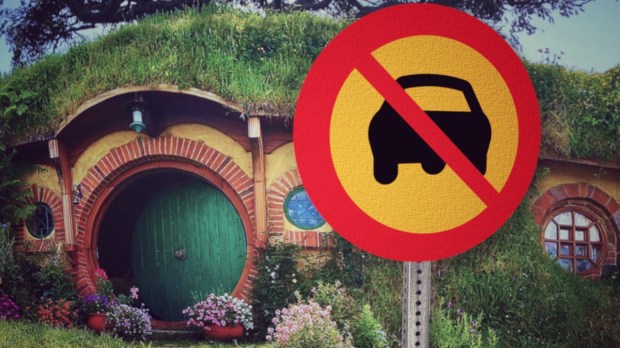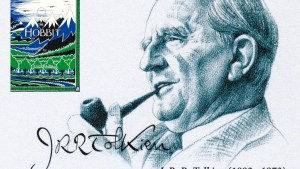Most of us who love the Lord of the Ringsbooks have felt the appeal of a hobbit’s life. These merry little folk live generally uncomplicated and joyful lives full of good cheer, song, good food and jolly (if sometimes nosey) community.
One of the most self-evident ways to live like a hobbit is also pretty counter cultural. It’s to ditch your car in favor of walking or biking to your destination instead.
Hobbits, and most of the good creatures in Lord of the Rings, consistently opt for a simpler and slower pace of life. Industrialization and polluting machinery in the series are consistently symbols of evil, embodied by Sauron and his orcs.
The series’ none-too-subtle rejection of industrialization reflects author J.R.R. Tolkien’s own personal views. After owning a car for a time when his four children were little (an experience that provided the inspiration for his little-known storybook Mr. Bliss), Tolkien sold the car and switched to a bicycle as a matter of principle.
A cautionary message from his writings is that “we must recognize the machine for what it is — a mere tool with the potential to enslave, against which we must be ever on guard.”
Tolkien’s loathing of motor-cars
It’s a little-known fact that Tolkien abhorred cars to an intense degree. As Tom Neas points out in a Geek Insider piece:
Tolkien did own a car for a short period of time. He purchased a Morris Cowley in 1932, which he named “Jo.” A few years later he replaced Jo with a new car, creatively named “Jo 2.”
Tolkien was not a good driver; on an early visit to his sister he knocked down part of a stone wall. However, he was brazen, speeding down Oxford streets with little concern for other drivers or pedestrians, crying “Charge ’em and they scatter!”
By the start of the second World War, Tolkien gave up driving, as rationing had begun. Around the same time, he noticed the damage that cars did to the landscape and never drove again, which gave rise to his more well-known negative views on cars.
Cars destroyed peace and beauty, he felt, and made life less pleasant all around. He referred to a car’s motor as the “infernal combustion engine,” as in a letter to his son in 1944,
It is full Maytime by the trees and grass now. But the heavens are full of roar and riot. You cannot even hold a shouting conversation in the garden now, save about 1 a.m. and 7 p.m. – unless the day is too foul to be out. How I wish the “infernal combustion” engine had never been invented. Or (more difficult still since humanity and engineers in special are both nitwitted and malicious as a rule) that it could have been put to rational uses—if any.
Cars symbolize “spirit of Isengard”
I don’t think it’s a coincidence that he named the villain in The Hobbit Smaug, like the smog of factories and machines.
He referred to “destroying Oxford in order to accommodate motor-cars” as an example of “the spirit of ‘Isengard,’ if not of Mordor.”
Harsh words, but does Tolkien perhaps have a point? Besides the congestion, traffic, and commotion cars cause, they can distance us from our neighbors, removing opportunities for casual daily interactions that bring so much happiness.
Loads of research support the mental and physical health benefits of walking and biking (check out the Netflix documentary Live to 100: Secrets of the Blue Zones for more!).
If you’ve ever wanted to live like a hobbit, maybe you can find an opportunity to ditch the car for an outing this week. Any chance that destination is close enough to walk or bike instead? And who knows, perhaps this outing will lead you to a memorable adventure you never would have found otherwise.



